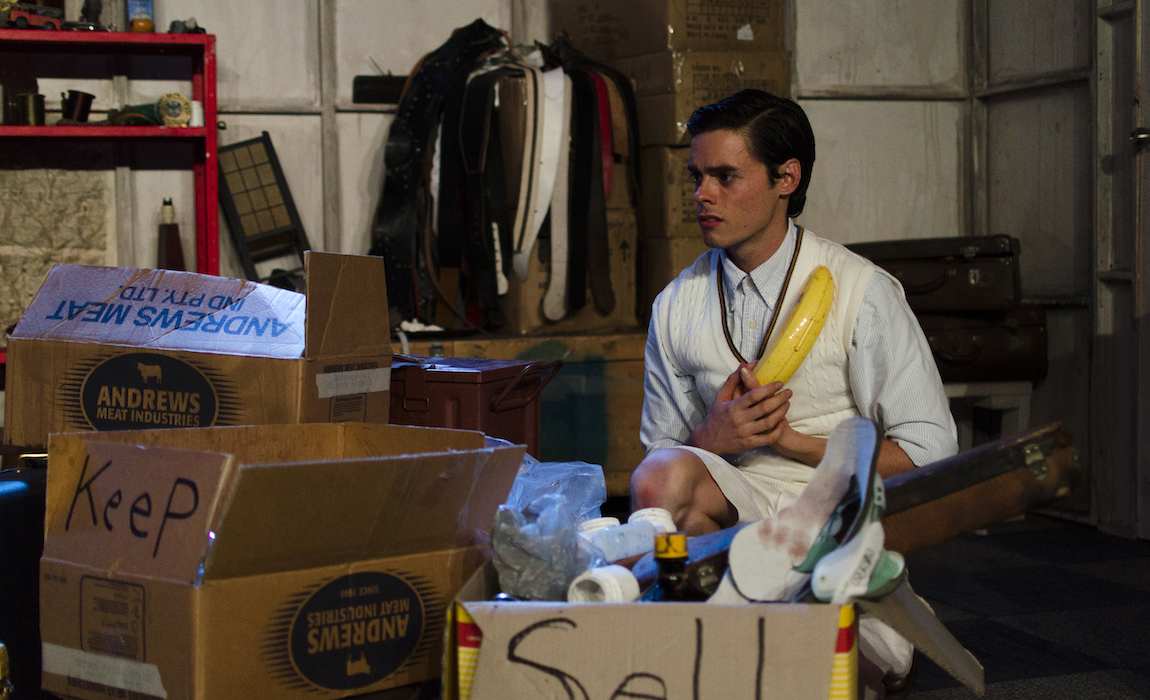A Butcher of Distinction
Two British country lads go from punting on the Thames to the basement of a Guy Ritchie film.
Overview
The plastic flaps make this play. They're hanging in the theatre doorway, thick, long, translucent and evocative. They're exactly the sort you see separating the sparkling-tiled butcher's shopfront from its bloody back room, and now you're already thinking about big knives and intestines. Flipping through the flaps, you'll find two guys in crisp cricket whites, hair slicked back and carefully parted, frozen on stage and blinking around. One moos occasionally, and the other bleats. Rain patters in the background. It's bleak and weird, and a great start.
This is Hartley (Heath Ivey-Law) and Hugo (Liam Nunan), A Butcher of Distinction's twin protagonists, and in the opening scene they're plucking through their father's belongings, snatching up bits to sell. They're out of their element, far away from their isolated country estate and trembling in the dank basement of a London pub. They whimper about their inheritance, and start to plan, poorly, for dealing without it. Their father, we learn, has killed their mother and shot himself dead.
They're delicate brats wetting themselves at the prospect of job-hunting. Their parents' death seems more like a financial loss than an emotional one, and so it's not easy to care about their problems. The director, James Dalton, says in the program that they do become likeable, but it didn't happen.
Teddy (Paul Hooper) crashes in with a lot of thumping, shouting, drinking and chest hair. He owns the pub and knows a lot more than the twins about their father's sleazy dealings down here. He also knows that he is owed money. Apparently the old man used this dump to indulge in some gross stuff, and now, says Teddy, the twins will have to pay off the debt at a pretty devastating personal cost. And the twins are all "oh dear, okay", which seems implausible, and the writing doesn't redeem itself from there.
A Butcher of Distinction is a fresh piece from 25-year-old British playwright Rob Hayes, and it's so exciting to have young work on in cool Sydney spaces. But this script is undercooked. Main characters don't have to be likeable or their situations relatable, but cutting plot corners in the same script is asking too much of the audience. These characters aren't nuanced but just plain inconsistent; the twins supposedly work as a goat herder and butcher, but they're portrayed as privileged wimps until suddenly flipping at the end. The script aims for dark humour, but I just saw some pretty weak punchlines and a gory twist.
Stylistically there is strong stuff going on. You know how I feel about the plastic flaps; set designer Dylan Tonkin deftly conjures all kinds of unsettling ideas using just one set piece. Dalton's nailed the macabre atmosphere here, and that opening sequence is ace. The tiny theatre's size works for this play, too, as you feel uncomfortably close to some uncomfortable ideas. But comfortably close to the flaps.





